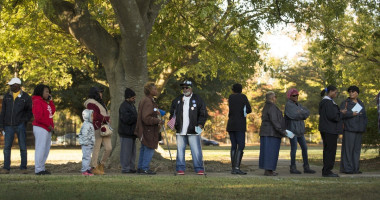U.S. Remains Outlier in Denying Voting Rights for Criminal Convictions as 4.4 Million People Disenfranchised Despite Worldwide Trend to Restore Eligibility, Human Rights Watch says ( www.hrw.org )
The United States is out of step with the rest of the world in disenfranchising large numbers of citizens based on criminal convictions, the Sentencing Project, Human Rights Watch, and the American Civil Liberties Union said in a report released today. In this US election year, and going forward, US states should reform their laws to ensure nobody is denied the right to vote due to a criminal conviction.
The 55-page report, “Out of Step: US Policy on Voting Rights in Global Perspective,” examines the laws of 136 countries around the world with populations of 1.5 million and above and finds that the majority—73 of the 136—never, or rarely, deny a person’s right to vote because of a criminal conviction. In the other 63 countries, the United States sits at the restrictive end of the spectrum, disenfranchising a broader swath of people overall.
“Wide access to voting is a cornerstone of rights-respecting, democratic government, which is why the right to vote is protected in international human rights law and why the US should reform its outlier status on voting rights,” said Alison Leal Parker, deputy US director at Human Rights Watch. “The right to vote, and the legitimacy of the democratic system in the United States, should not depend on its criminal legal system, which is built upon and perpetuates discrimination.”
Felony disenfranchisement laws in the United States date back to the end of the Civil War. After formerly enslaved Black men gained the right to vote through the 14th Amendment to the Constitution, state lawmakers began expanding the list of crimes defined as felonies to target Black people. At the same time, states began revoking voting rights for any felony conviction. Although the federal government officially barred some of these policies, known as “Jim Crow laws,” in the Voting Rights Act of 1965, felony disenfranchisement laws remain in 48 US states.
